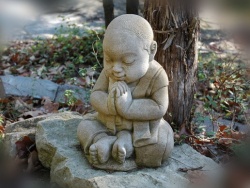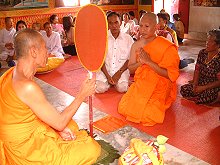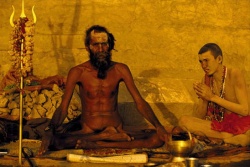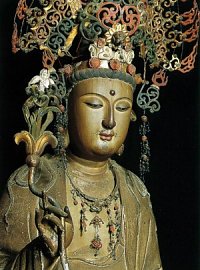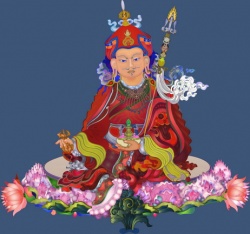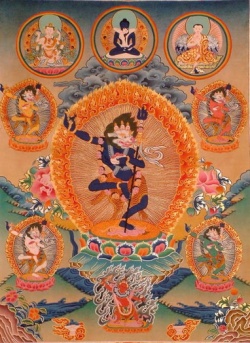Somāsuttaṁ: The Discourse about Somā
Somāsuttaṁ
The Discourse about Somā
163. Evaṁ me sutaṁ:
Thus I have heard:
ekaṁ samayaṁ Bhagavā Sāvatthiyaṁ viharati
at one time the Gracious One was dwelling near Sāvatthī
Jetavane Anāthapiṇḍikassa ārāme.
at Anāthapiṇḍika's grounds in Jeta's Wood.
Atha kho Somā bhikkhunī, pubbaṇhasamayaṁ nivāsetvā,
Then the nun Somā, having dressed in the morning time,
pattacīvaram-ādāya, Sāvatthiṁ piṇḍāya pāvisi.
after picking up her bowl and robe, was entering Sāvatthī for alms.
Sāvatthiyaṁ piṇḍāya caritvā, pacchābhattaṁ piṇḍapātapaṭikkantā,
After walking for alms in Sāvatthī, and returning from the alms-round after the meal,
yena Andhavanaṁ tenupasaṅkami divāvihārāya,
she approached the Blind Man's Wood to pass the day,
Andhavanaṁ ajjhogahetvā,
and having entered Blind Man's Wood,
aññatarasmiṁ rukkhamūle divāvihāraṁ nisīdi.
she sat down at the root of a certain tree to pass the day.
Atha kho Māro Pāpimā
Then the Wicked Māra
Somāya bhikkhuniyā bhayaṁ chambhitattaṁ lomahaṁsaṁ uppādetukāmo,
desiring to give rise to fear, terror, and horror in the nun Somā,
samādhimhā cāvetukāmo, yena Somā bhikkhunī tenupasaṅkami,
desiring to drive her out of concentration, approached the nun Somā,
upasaṅkamitvā Somaṁ bhikkhuniṁ gāthāya ajjhabhāsi:
and after approaching he addressed the nun Somā with a verse:
“Yaṁ taṁ isīhi pattabbaṁ ṭhānaṁ durabhisambhavaṁ,
“That place [1] which has been attained by the seers is hard to obtain,
Na taṁ dvaṅgulapaññāya, sakkā pappotum-itthiyā.” ti
No woman, with her two-finger wisdom, [2] is able to attain it.”
Atha kho Somāya bhikkhuniyā etad-ahosi:
Then it occurred to the nun Somā:
“Ko nu khvāyaṁ manusso vā amanusso vā gāthaṁ bhāsatī?” ti
“Who is this, a human or a non-human, speaking this verse?”
Atha kho Somāya bhikkhuniyā etad-ahosi:
Then it occurred to the nun Somā:
“Māro kho ayaṁ Pāpimā
“This is the Wicked Māra
mama bhayaṁ chambhitattaṁ lomahaṁsaṁ uppādetukāmo,
desiring to give rise to fear, terror, and horror in me,
samādhimhā cāvetukāmo, gāthaṁ bhāsatī.” ti
desiring to drive me out of concentration, who speaks this verse.”
Atha kho Somā bhikkhunī Māro ayaṁ Pāpimā iti viditvā,
Then the nun Somā having understood: This is the Wicked Māra,
Māraṁ Pāpimantaṁ gāthāhi paccabhāsi:
replied with these verses to the Wicked Māra:
“Itthibhāvo kiṁ kayirā, cittamhi susamāhite?
“What is to be made of womenhood when my mind is well-composed?
Ñāṇamhi vattamānamhi, Sammā Dhammaṁ vipassato.
When knowledges exist, [3] and Right Dhamma has been seen with insight. [4]
Yassa nūna siyā evaṁ: Itthāhaṁ puriso ti vā,
For whomever thinks thus: I am a woman or a man,
Kiñci vā pana aññasmiṁ, taṁ Māro vattum-arahatī.” ti
Or I am something other, deserves to have Māra speak to her.” [5]
Atha kho Māro Pāpimā: “Jānāti maṁ Somā bhikkhunī!” ti
Then the Wicked Māra (thought): “The nun Somā knows me!”
dukkhī dummano tatthevantaradhāyī ti.
and pained and depressed he vanished right there.
Footnotes
- ↑ Comm: ṭhānan-ti Arahattaṁ; place means Worthiness.
- ↑ Comm: dvaṅgulapaññāyā ti parittapaññāya, yasmā vā dvīhi aṅgulehi kappāsavaṭṭiṁ gahetvā suttaṁ kantanti, tasmā itthī dvaṅgulapaññā ti vuccati; two-finger wisdom means having little wisdom, because having grabbed the cotton with her two fingers she spins thread, therefore a woman has two-finger wisdom is said.
- ↑ Comm: ñāṇamhi vattamānamhī ti phalasamāpattiñāṇe pavattamāne; when knowledge exists means when the knowledge of fruition attainment exists.
- ↑ Comm: dhammaṁ vipassato ti catusaccadhammaṁ vipassantassa, pubbabhāge vā vipassanāya ārammaṇabhūtaṁ khandhapañcakam-eva; Dhamma has been seen with insight means the Dhamma of the Four Truths has been seen with insight, or previously seeing the five constituents objectively with insight.
- ↑ Comm: kiñci vā pana aññasmī ti aññaṁ vā kiñci 'ahaṁ asmī' ti, taṇhāmānadiṭṭhivasena yassa siyā; or I am something other means there will be some other 'I am', on account of craving, conceit or views.
